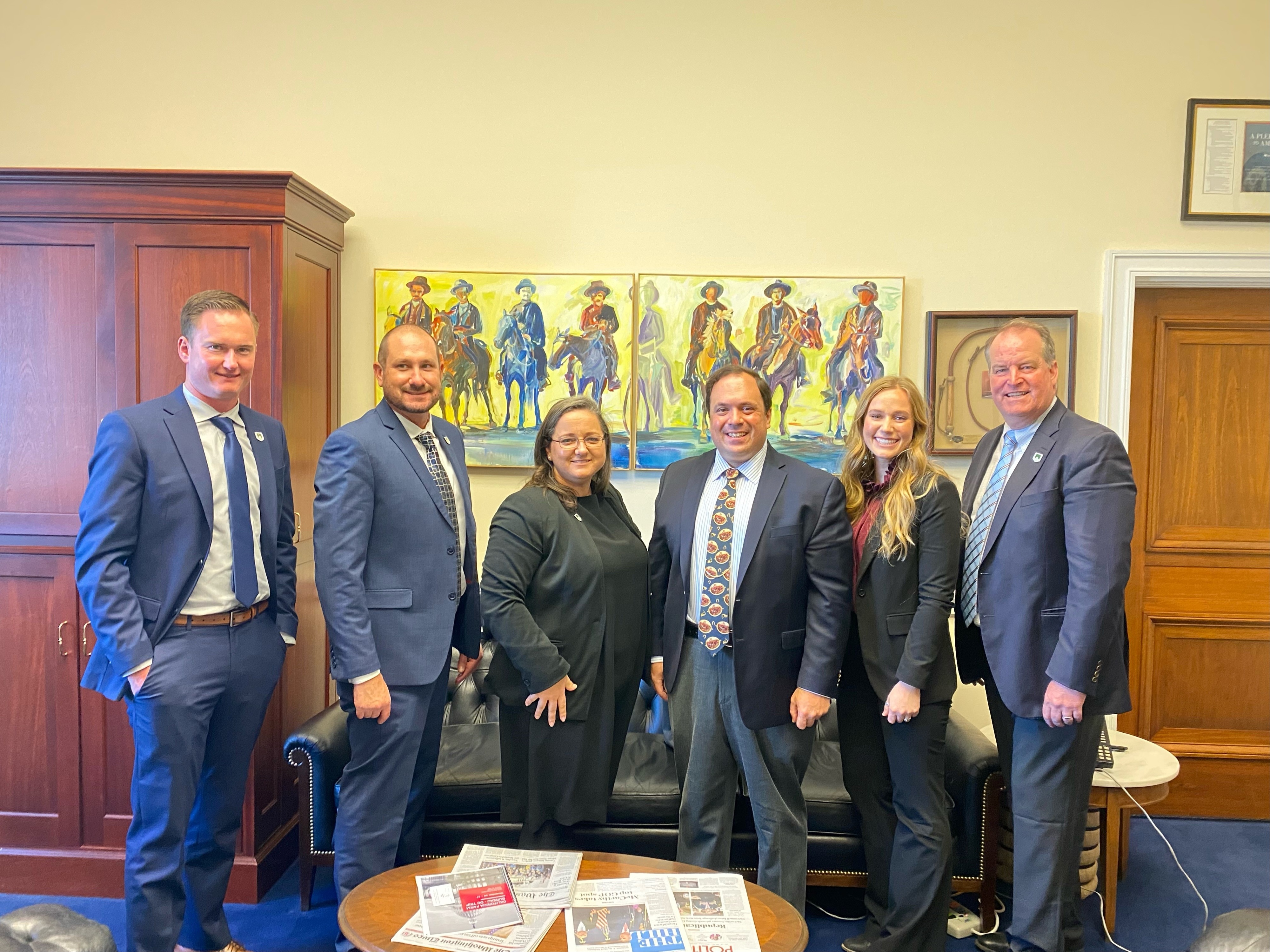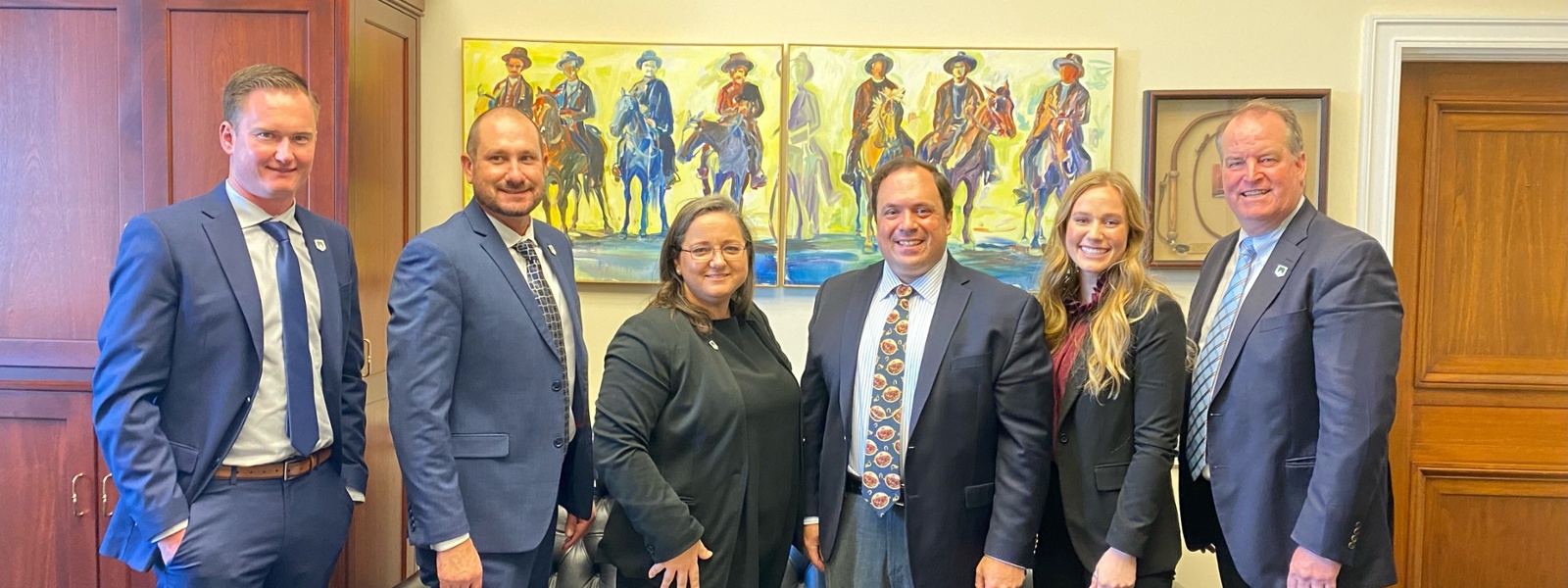Farm delegation advocates for ag in nation's capital


By Christine Souza
As the nation learned that the midterm election led to a change in the balance of power in the next U.S. Congress, a delegation of California Farm Bureau leaders met with representatives during an advocacy trip to Washington, D.C., to discuss pressing issues affecting agriculture.
“It is a really interesting time to be in Washington, D.C., following the midterm election and before a lame-duck session with just a few more weeks of work left this Congress,” said California Farm Bureau First Vice President Shannon Douglass, who raises beef cattle, sunflowers, pumpkins, corn and forage crops in Glenn County. “We met with members who represent our farm communities and members who represent our urban communities to continue building relationships critical to our farmers and ranchers.”
Farm Bureau executives, the organization’s Leadership Farm Bureau class and county leaders were joined by the organization’s federal policy team and met face to face with lawmakers Nov. 14-17 in the nation’s capital. Discussions focused on issues including California’s ongoing drought, water, labor and trade, as well as the next federal farm bill.
“As we met with lawmakers and their staff, they all seemed excited to hear from us and hear what issues are affecting our operations and the agricultural industry in California,” said Stephen Waldron, a field automation supervisor at Plantel Nurseries, and member of this year’s Leadership Farm Bureau class from Santa Barbara County. “The Congress members we met with are hopeful for a productive next few weeks as they get ready for the end of the session.”
In working to secure a stable workforce for agriculture in California, the delegation urged legislators to pressure the Senate to approve the Farm Workforce Modernization Act, which was passed in the House. The bipartisan immigration legislation would provide undocumented farmworkers and their family members with a path to legal immigration status and residency, revise the H-2A agricultural guestworker program to improve efficiency and reduce costs, and impose mandatory employment verification in agriculture many years down the road. The group heard from members of Congress who support the legislation.
“There is still time for the Senate to make something happen in the next few weeks regarding the Farm Workforce Modernization Act, which would add reliability to the agricultural workforce and streamline the H-2A visa program,” Douglass said. “It would be really impactful for our farmers if the Senate passed that bill.”
With California entering a potential fourth consecutive drought year, the delegation advocated for increased federal investment in projects that bolster the state’s aging water infrastructure and would increase water reliability for cities and the environment in future droughts.
Tulare County citrus farmer Matt Watkins and farm manager for Bee Sweet Citrus in Fowler said he and fellow Farm Bureau leaders emphasized to lawmakers and their staff the critical importance of water supply certainty and continued investment in Western water infrastructure.
“With SGMA (Sustainable Groundwater Management Act) as law in California, we (farmers) no longer have a savings account when it comes to water,” said Watkins, an agricultural stakeholder on the East Kaweah and Eastern Tule groundwater sustainability agencies. “In the past, that had been groundwater in times that we didn’t receive rain or snow. Now, if it doesn’t rain or snow, we’re pretty much on the brink of going out of business in a lot of areas.
“This especially affects the small guy or the family farmer who can’t afford to buy extra water or high-priced water,” Watkins added. “The problem with this state groundwater regulation is it hurts the smallest farmers and those who can’t afford it the most.”
In discussions with lawmakers about water shortage, Watkins said, conversations centered on opportunities to dedicate more funding to Western water needs as part of an omnibus spending bill before the end of the year. Watkins said another avenue could involve a new Water Infrastructure Improvements for the Nation Act—a public works program last enacted in 2016—emerging during the next Congress. Other actions, he said, may include relaxing regulations, such as adjusting the amount of water required to be stored behind dams for flood control.
“It seems like all of the Western representatives are working on water and making it a priority and hopefully loosening some of the regulations on moving water and adding flexibility,” Watkins said.
During meetings in which the 2023 Farm Bill was discussed, Farm Bureau leaders emphasized that the nation’s next farm policy should include a better safety net for specialty crops.
“For California, the ask is to make sure that specialty crops are represented on the crop insurance side, so making sure all the crops have that similar backbone,” Watkins said. “It is important to build really adequate crop insurance programs that most individuals would be willing to buy into so that they are not relying on disaster aid.”
In their meetings, the attendees were able to meet with lawmakers that serve in the House Committee on Agriculture, which has oversight of the development of the next farm bill.
Matthew Viohl, California Farm Bureau associate director of federal policy, said passing the farm bill will require a bipartisan effort with a slim Republican majority in the House and thin Democratic majority in the Senate. Several House members stressed that most farm bill priorities cut across party lines, as regional differences tend to cause the most avenues for disagreements.
During a meeting at the Japanese embassy, the Farm Bureau delegation discussed trade with representatives of the country’s ministry of agriculture. Talk centered on Japan’s interest in importing more agricultural goods from California and impacts of the ongoing drought.
Donald Wirz, a winemaker from San Benito County, said the Japanese embassy visit was a reminder of the global food impacts that the ongoing drought has on California-grown commodities.
“They were very interested in the lack of rice planted in California due to drought,” said Wirz, a member of Leadership Farm Bureau. “It drove home the impacts that a lack of maintenance on our water infrastructure and drought have on the ability to feed ourselves and the world.”
Douglass said, “Visiting Washington, D.C., is a reminder that it is important that we continue to advocate and talk to members of Congress.”
“If you can’t make it to D.C., there are a lot of ways that members can engage, such as visiting members in their home districts,” she said. “The connections we make and lawmakers hearing feedback from our Farm Bureau leaders really do matter.”
(Christine Souza is an assistant editor of Ag Alert. She may be contacted at csouza@cfbf.com.)




